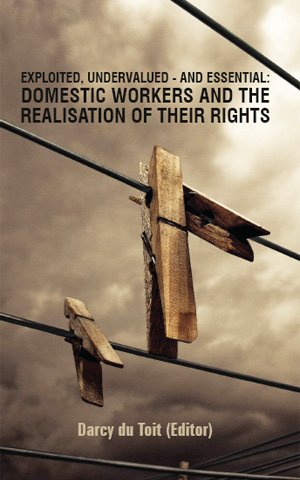Exploited, undervalued - and essential: Domestic workers and the realisation of their rights
Edited by Darcy du Toit
2013
ISBN: 978-1-920538-20-0
Pages: viii 380
Print version: Available
Electronic version: Free PDF available
About the publication
Millions of domestic workers experience exploitation in the privacy of their employers’ homes; also in South Africa they are to a large extent beyond the reach of legal protection. This book sums up four years of research on ways of realising their rights. It highlights their essential role, both as care-givers and in enabling their employers to work outside the home. Against the background of the Constitution and international law it examines ways of adapting the legal framework as well as alternative mechanisms, including new forms of organisation, for translating basic rights into effective regulation.
This book contains the findings of the Domestic Workers Research Project (DWRP), based on research conducted under the auspices of the Social Law Project (SLP) at the University of the Western Cape from 2009 to 2012. The idea of the project arose in 2008 from a suggestion by Advocate Roseline Nyman of the Cape Bar, subsequently a member of DWRP’s Reference Group, that domestic work was an area in need of in-depth research from the perspective of the implementation of workers’ rights. This was certainly an exciting if somewhat daunting proposition. The sector called out for attention not only because of its size, its de facto lack of regulation and the fact that domestic workers are mainly black women bearing the brunt of historical disadvantage; it also presents a unique set of challenges in terms of the conceptual and institutional framework of labour law. The mismatch between conventional labour law and nonstandard forms of employment in the context of globalised markets (discussed more fully in the chapters that follow) has long been an area of debate, research and legislative responses which, by and large, have not surmounted the problem. In the domestic work sector these questions present themselves in particularly intractable forms. Any progress towards developing effective forms of regulation in this sector, it seemed, would not only improve the lives of domestic workers; it might also provide some ideas for the development of labour law more generally in responding to the challenges of informalisation and deregulation across a range of sectors.
And, at approximately the same time, the Governing Body of the International Labour Organisation (ILO) was approving a proposal to set standards on decent work for domestic workers, starting a process that would lead to the adoption of the ILO’s Domestic Workers Convention and its accompanying Recommendation in June 2011. DWRP sought to contribute to this process, inter alia by providing research support to the South African workers’ and government delegations to the International Labour Conference in 2010 and 2011, and has joined others in hailing the Convention as a landmark. But, in itself, the Convention does not answer the question that motivated this research: how can equal treatment and decent work for domestic workers be turned into a practical reality? It is for readers to judge how far DWRP has succeeded in taking the inquiry forward, not only at the level of knowledge production but in terms of applied research aimed at finding better ways of dealing with the problems that have thus far obstructed the implementation of domestic workers’ rights. We ourselves, certainly, are the first to recognise that a great deal still remains to be done in the area of research as well as advocacy; and, for this reason, implementation of workers’ existing rights rather than the formulation of new rights is being considered as the focus of SLP’s research in the years ahead.
About the editor:
Darcy du Toit is Emeritus Professor at the Faculty of Law, University of the Western Cape.
Table of Contents
INTRODUCTION
CONTRIBUTORS
- Situating domestic work in a changing global labour market
Darcy du Toit - Advancing domestic workers’ rights in a context of transformative constitutionalism
Wessel le Roux - Implementing domestic workers’ labour rights in a framework of transformative constitutionalism
Darcy du Toit and Elsabé Huysamen - Implementing domestic workers’ social security rights in a framework of transformative constitutionalism
Kitty Malherbe - Nurturing a culture of compliance with domestic workers’ rights in South Africa
Pamhidzai Bamu - Rights across borders: policies, protections and practices for migrant domestic workers in South Africa
Jennifer N. Fish - Organising for empowerment
Nandi Vanqa-Mgijima, Yvette Wiid and Darcy du Toit - Constructing an integrated model for the regulation and enforcement of domestic workers’ rights
Darcy du Toit
BIBLIOGRAPHY
